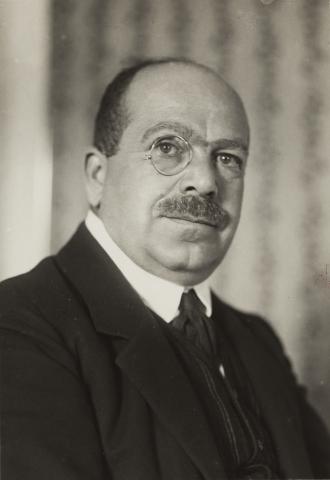Alexander Friedrich Ladislaus Roda Roda was born Sándor Friedrich Rosenfeld in Drnowitz, Moravia, in 1872 and grew up in Slavonia, present-day Croatia, where his father worked as an estate manager near the village of Zdenci. Together with his younger sister Marie, he wrote literary texts from an early age. He began studying law in Vienna in 1890, but then decided to pursue an officer's career. At the age of 22 he converted from Judaism to Catholicism. Rosenfeld changed his last name to Roda (English: stork) in 1899 and to Roda Roda in 1906. In December 1900 he met the actress Adele Sandrock (1863-1937) in Osijek in what was then the Kingdom of Croatia and Slavonia, where he was stationed, and she was on tour. The engagement took place as early as 27 January 1901, but the couple soon broke it off. In 1902 he processed this brief and passionate relationship in the play Dana Petrowitsch. After first publishing work in the Munich satirical magazine Simplicissimus in 1900, he requested a transfer to the reserves in 1901 with the rank of first lieutenant and from then on lived alternately in Vienna, Munich, Berlin, Paris and Graz as a freelance writer and journalist. In 1905 he united in "free marriage" with Elsbeth Freifrau von Zeppelin, née Leuckfeld von Weysen. This contributed to his mocking anecdotes about the Imperial Royal military and his public appearances in 1907. This, along with his mocking anecdotes about the military and his public appearances, contributed to his dismissal from the army in 1907. His best-known work is the play Der Feldherrnhügel, which premiered in 1909 and in which he caricatured the Imperial Royal army. Roda Roda, who in Nazi diction was considered a Jew despite his conversion and as such was threatened with persecution, emigrated with his wife via Switzerland to New York in February 1938. Before his emigration, he had given his landlady in Graz two suitcases with manuscripts, correspondence and other documents for safekeeping. In 1942, this bundle reached the Austrian National Library (ÖNB) by a hitherto unexplained route and was added to the collection with the stamp "P38" for "Polizei 1938," which marked the objects brought in by the Gestapo. Parts of it, namely photographs by Adele Sandrock, went to the Theater Collection, which had been founded as an independent department of the ÖNB in 1922. After the end of the war, Roda Roda approached his former landlady in Graz to retrieve the suitcases containing his documents. The latter denied having taken them over, but neither Roda Roda nor later his daughter instituted legal proceedings against her. On 20 August 1945, Alexander Roda Roda died of leukemia in New York.
At its meeting on 26 June 2000, the Art Restitution Advisory Board recommended that the "Roda-Roda Bequest" be handed over from the ÖNB to its heirs. The letters comprised a total of 494 autographs from 100 writers to Roda Roda, including correspondence with Adele Sandrock, for example, but also with fellow writers such as Arthur Schnitzler, Hugo von Hofmannsthal and Stefan Zweig. In 2001, the Art Restitution Advisory Board recommended the return of 19 photographs of Adele Sandrock - two of the original 21 inventory numbers could no longer be found - from the Austrian Theater Museum. In the course of systematic provenance research, 18 additional printed materials from the Roda Rodas library were identified in the ÖNB, whose restitution was recommended by the Art Restitution Advisory Board in 2004. The Vienna City Library's manuscript collection, which had already had part of the Roda Roda estate since 1986, acquired the restituted holdings in 2002 and 2011.

